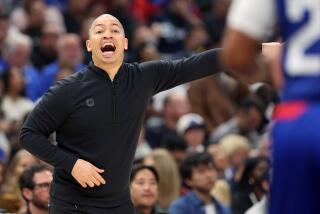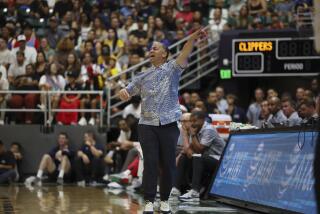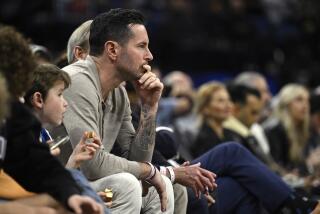INTERIM COACH : Don Chaney : The Clippers Aren’t Going Anywhere, but Their Coach Would Like to Stay Around
- Share via
Whoever thought of the term interim coach obviously didn’t realize it was redundant. All coaches are interim. Some just last longer in the job than others.
But when someone is specifically labeled an interim coach, he knows not to settle in and buy a new house. Something about that designation suggests that he’s just filling in until a real coach can be found.
That may or may not be the case with Don Chaney, who took over as interim coach of the Clippers when Jim Lynam was fired March 6. It has yet to be determined whether the interim designation or Chaney himself will be removed first.
Clipper General Manager Carl Scheer has not set a limit on the number of victories Chaney will need to stay around, which probably is fortunate for Chaney since the Clippers are 2-7 under his direction.
What Chaney must do to remain coach, according to Scheer, is inspire significant improvement in a downtrodden team that has shown only brief glimpses of life this season. Considering that Chaney took over with only 21 games left in the season, it is a difficult task.
Even if the Clippers do improve under Chaney in the next three weeks, Scheer may still decide to select a more experienced coach, or a coach with a reputation.
Already, there has been talk that Scheer is considering Jerry Tarkanian, head man at Nevada Las Vegas, and Bob Boyd, former USC coach who now is coaching at Mississippi State. Boyd was seen at Sunday’s Clipper-Golden State game and met with Scheer.
It is also believed that Scheer would like to hire Larry Brown, former UCLA coach who now is coaching at Kansas. Scheer and Brown worked as a general manager-coach combination with the Carolina Cougars of the old American Basketball Assn. and the Denver Nuggets. In informal discussions, however, Brown has said that he isn’t interested.
Chaney, 38, didn’t ask for promises when he agreed to the interim arrangement, and none were offered. Yet, Scheer says that Chaney is getting a fair chance to prove himself as an NBA coach after five years as an assistant.
“Don will be a legitimate candidate,” said Scheer, choosing words carefully. “I’m not saying he’ll be the leading candidate. Right now, he’s the coach. But I’m going to interview a lot of different coaches around the country after the season and get the best guy for the job. This is the most important decision the franchise has to make.”
Scheer said of Boyd: “He asked to see me about the job. He’s a candidate, like everyone else. I want to develop a concept so that we will pick the very best college coach, or a professional coach with experience. Boyd would be a candidate, as would Tarkanian if we decide to go with a top college coach.”
Obviously, the situation Chaney now faces is far from ideal, and perhaps not even fair.
Here are the Clippers, stumbling through the final quarter of the National Basketball Assn. season with a 24-46 record and no chance of qualifying for the playoffs. And here is Chaney, working frantically to try to change in five weeks what players have been doing the last five months.
Chaney, nicknamed Duck since childhood, is changing almost everything in an attempt to avoid being a lame-duck coach. He has installed a fast-break offense to replace Lynam’s half-court game, has utilized a half-court trap on defense, and has tried to stamp out the Clippers’ defeatist attitude. So far, though, the results have been the same.
“There’s so much to do and so little time to do it,” Chaney said recently. “But I expected it to be this rough. Given the circumstances, you can’t turn a team around in 21 games. It’s tough. Maybe only the players can appreciate what I’m trying to do.
“To be honest, it was only fair of Carl not to say I had to win right away. You’d be insane to say that I’d have to go .500 to keep the job. Carl knows what the situation is like.”
There is pressure on Chaney now that he couldn’t experience as Scotty Robertson’s assistant at Detroit for three seasons and Lynam’s assistant the last two.
But pressure has been following Chaney almost all his life. It was there in high school, when he was one of the most highly recruited players in the South. It was there when he and Elvin Hayes became the first black basketball players at the University of Houston in the mid-1960s. And it was there during Chaney’s 12 years as a player in the NBA, which were highlighted by two championships with the Boston Celtics.
But Chaney always figured that putting up with the pressure was a small price to pay for playing basketball, which always has been a major part of his life. Chaney said that while he was growing up in Baton Rouge, La., he played basketball from morning to night some days.
The basketball court was sort of a day-care center for Chaney’s mother, who held down two jobs while bringing up her four children alone. Chaney’s parents were divorced when Don was young.
“Let me tell you what it’s like in the deep south,” Chaney said. “There’s a family-type atmosphere among everybody in the neighborhood. If a woman down the street saw another kid mess around, she’d take out a belt and whack him.”
Even though Chaney averaged 28 points a game his senior year in high school and was named a prep All-American both athletically and scholastically, he still felt he was just another kid from the neighborhood.
But he was different because he had the opportunity to attend any college he desired. Chaney wanted to sign with Loyola of Chicago, but his mother overruled him, saying that Houston would be the better choice.
At that time, no black basketball players had ever played at Houston. Chaney and Hayes, who also grew up in Louisiana, were the first.
“I was afraid, but my mother wanted me to go there,” Chaney said. “She said it was a chance in a lifetime and she was right. But to me, it was a serious problem. I had gone to an all-black high school and it was an adjustment.”
Chaney, a 6-foot-5 guard, did adapt, though, to school, social life and major-college basketball. In his first varsity season, he averaged more than 20 points a game. But in Chaney’s last two seasons, Coach Guy Lewis had the ball fed to Hayes whenever possible. Chaney became mostly a defensive player, although he still averaged 15 points a game.
The highlight of Chaney’s college career occurred midway through the 1968 season when the Cougars broke UCLA’s winning streak in a classic matchup between Hayes and Lew Alcindor, as Kareem Abdul-Jabbar was known then.
“It was unbelievable,” Chaney said. “We were both undefeated and that game would show who was No. 1--until the tournament.”
UCLA, of course, avenged that defeat and won the NCAA title, but that disappointment was eased for Chaney when he was drafted in the first round--he was the 10th player chosen--by the Boston Celtics.
It so happens that Boston was the team Chaney had admired while growing up, the team he yearned to play for.
“I had a hint they’d get me,” Chaney said. “(Bill) Russell and Red (Auerbach) had come and scouted me. I had grown up with the Celtics. They had players that were recognizable. Everybody knew them.”
The NBA, though, was an adjustment for Chaney. Rookies with the Celtics rarely played in those days, and Chaney said his first year with Boston was wasted because he sat so much. It wasn’t a total waste, however. The Celtics won the NBA title and Chaney had his first championship ring. Halfway through his second season, when Chaney and then-rookie JoJo White were given more playing time, Chaney responded so well that he became a regular.
In the early 1970s, Chaney became known as a defensive specialist. He was named to the All-NBA defensive second team for four straight seasons. In 1974, his contract expired and he sought a new Celtic contract that he believed would be commensurate with his play.
Apparently, what Auerbach offered wasn’t what Chaney had in mind, and Chaney jumped to the now-defunct American Basketball Assn., signing with the St. Louis Spirits for $200,000, considered a bundle then.
Chaney’s defection rocked the Celtics, who had projected the image of a happy family. When Chaney left, Celtic teammate and friend Dave Cowens jokingly sent him a T-shirt that said “Benedict Arnold.”
Life in the ABA was an adjustment, too. That league was known for its outstanding offensive players, and Chaney was a defensive specialist. Things went well for a while, though. The Spirits had such exciting young players as Moses Malone, M.L. Carr, Marvin Barnes, Maurice Lucas and Chaney. But Chaney torn ligaments in his knee, Malone broke his foot and Barnes had legal problems. Those problems broke the Spirits’ spirit.
The ABA folded after that season and Chaney signed with the Lakers. He played three seasons in Los Angeles but lost his job to a rookie named Norm Nixon in 1977. Eventually, Chaney was traded back to the Celtics, who apparently had forgiven him for defecting.
It wasn’t the same, though, in Boston. Chaney had lost a step because of the knee injury and retired in 1980.
“I knew it would be my last year in Boston and a lot of people had contacted me about doing some scouting after that,” Chaney said. “I wanted to get into real estate. I had friends who made a good living from that. Also, I really wanted to build good, low-income housing for people.”
But when Scotty Robertson asked Chaney to become an assistant coach at Detroit, Chaney didn’t think twice about moving his family--wife, Jackie, and three children--to Detroit.
“The thing that made my decision for me was seeing players who are out of basketball,” Chaney said. “They miss all the attention. This was an opportunity for me to still be involved, and I had thought about coaching.”
After three seasons under Robertson, Chaney believed that he was ready to become a head coach. When Robertson was fired after the 1982-83 season, Chaney figured he would have a good chance to become the Pistons’ new coach.
Chaney’s name was not the first one on Detroit General Manager Jack McCloskey’s list, however. Jack McKinney and Phil Johnson both were ahead of him, and McCloskey ultimately chose Chuck Daly, former Philadelphia assistant. Since Daly brought in his own assistants, Chaney was out of a job again.
He got offers from friends and thought about real estate again, but Chaney still wanted to stay in the NBA. He contacted Lynam, who had just taken over as coach of the San Diego Clippers.
Chaney says he did not take the job with the intention of someday replacing Lynam. “But I didn’t want to become labeled as an assistant coach,” he said. “Some guys in the league are career assistant coaches.”
Speculation about Lynam’s job security arose in December, and Chaney’s name naturally came up as a replacement.
“I never uttered a word to anybody when I felt Jimmy’s job was in jeopardy,” Chaney said. “I never solicited it for myself.”
Clipper players liked Chaney, however, and did the soliciting for him. When Lynam was finally fired March 6, Scheer chose Chaney as Lynam’s interim replacement.
If that status has a disquieting effect on Chaney, it doesn’t show.
“I try to keep that out of my mind,” Chaney said. “It’s the ostrich syndrome. I keep my head in the sand about it. I’m just going to do the best I can and if we lose every game, then we do.
“If something’s going to happen, it’s going to happen and there’s nothing you can do about it. If I’m not rehired next year, then I’ll look for another job. I know I can coach. I’d just like the chance.”
More to Read
Go beyond the scoreboard
Get the latest on L.A.'s teams in the daily Sports Report newsletter.
You may occasionally receive promotional content from the Los Angeles Times.






